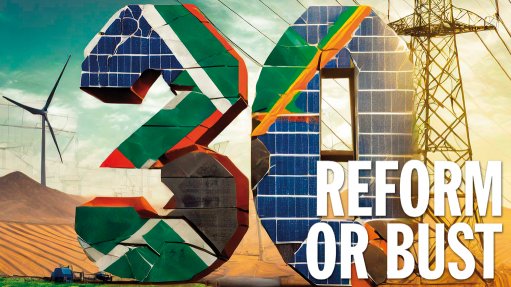Africa’s trade bloc mirage
The word ‘mirage’ originates from the Latin mirari, which means to look at, to wonder at, to mirror or to admire. There are, in fact, three categories of a mirage: inferior, superior and Fata Morgana, with the last mentioned consisting of a series of unusually elaborate and vertically stacked images, which form one rapidly changing mirage.
So, what do you make of the assertion that the African continent’s and world’s largest conceptualised free trade zone will boost South Africa’s sluggish economy? On October 7, news agency Bloomberg, reporting on President Cyril Ramaphosa’s weekly newsletter, stated: “The African Continental Free Trade Area will be a game changer for South Africa . . . Africa’s most industrialised economy is well placed to benefit, owing to its established manufacturing base, developed infrastructure and deep financial markets.”
Not so long ago, South Africa was Africa’s largest economy. Now it is Africa’s most industrialised economy, but not the largest on the continent. Taking into account the rate of deindustrialisation in the country, it might not be long before other African countries catch up with or even surpass it. South Africa is actually retreating towards other African economies as far as industrialisation is concerned. Indeed, the South African government is presiding over a steadily eroding manufacturing base.
Now for South Africa’s ‘developed infrastructure’ . . . it is considered to be developed when compared with what? The solution to the country’s infrastructure challenge can be summarised in a word – maintenance. But who is going to pay for it? A hint – it will not be government, as it simply does not have the resources to do so. Even if it had, after picking up the Eskom tab, there would be little left. Consequently, government’s sole tactic seems to be convincing would-be investors of the supposed opportunity to invest in South Africa’s infrastructure, but who will be willing to do so, and what will be the return? There seems to be this naive belief that investment in infrastructure would be made for the greater good, instead of with a view to earning a favourable return. You could also read guaranteed return. Investment is, contrary to the South African belief, not a charitable endeavour: it is done for a profitable return.
This leaves ‘deep financial markets’, but what is meant by this term? This is a term for which your favourite search engine would not be able to find a definition. Financial markets are broadly defined by www.investopedia.com as any marketplaces where the trading of securities occurs, and these include the stock market, the bond market, the forex market and the derivatives market, among others. Is the perception that African firms would be inclined to invest in South Africa’s financial markets, while South African companies would prefer to invest in international financial markets? Why would companies from other African countries not do likewise? Is the perception that South African companies are international, while African companies are continental?
‘Well placed’ means ‘having a fortunate or advantageous position’, which is questionable in the context of South Africa’s manufacturing base, infrastructure and financial markets.
A final observation from the newsletter: “The economies of the African continent are together growing at a rate far greater than our own, and we need to see the opportunity that such growth presents for our economy and for our people. South Africa’s future lies in Africa. It is through our trade with the rest of the continent that we will grow our industries.”
The African countries’ economic growth rate is higher simply because this growth is off a lower base, and is no measure of the purchasing power of these countries. Exactly what “opportunity such growth presents for our economy and for our people” means is uncertain. If the perception is that it would be “through our trade”, then the South Africa government has another thing coming. For one, South Africa is not a low-cost producer. Secondly, it underestimates the aspirations of countries such as the People’s Republic of China. Thirdly, the belief that African countries will act as a collective, working collectively and towards a singular goal, is misplaced. Such a perception is South Africa’s own Fata Morgana.
Comments
Press Office
Announcements
What's On
Subscribe to improve your user experience...
Option 1 (equivalent of R125 a month):
Receive a weekly copy of Creamer Media's Engineering News & Mining Weekly magazine
(print copy for those in South Africa and e-magazine for those outside of South Africa)
Receive daily email newsletters
Access to full search results
Access archive of magazine back copies
Access to Projects in Progress
Access to ONE Research Report of your choice in PDF format
Option 2 (equivalent of R375 a month):
All benefits from Option 1
PLUS
Access to Creamer Media's Research Channel Africa for ALL Research Reports, in PDF format, on various industrial and mining sectors
including Electricity; Water; Energy Transition; Hydrogen; Roads, Rail and Ports; Coal; Gold; Platinum; Battery Metals; etc.
Already a subscriber?
Forgotten your password?
Receive weekly copy of Creamer Media's Engineering News & Mining Weekly magazine (print copy for those in South Africa and e-magazine for those outside of South Africa)
➕
Recieve daily email newsletters
➕
Access to full search results
➕
Access archive of magazine back copies
➕
Access to Projects in Progress
➕
Access to ONE Research Report of your choice in PDF format
RESEARCH CHANNEL AFRICA
R4500 (equivalent of R375 a month)
SUBSCRIBEAll benefits from Option 1
➕
Access to Creamer Media's Research Channel Africa for ALL Research Reports on various industrial and mining sectors, in PDF format, including on:
Electricity
➕
Water
➕
Energy Transition
➕
Hydrogen
➕
Roads, Rail and Ports
➕
Coal
➕
Gold
➕
Platinum
➕
Battery Metals
➕
etc.
Receive all benefits from Option 1 or Option 2 delivered to numerous people at your company
➕
Multiple User names and Passwords for simultaneous log-ins
➕
Intranet integration access to all in your organisation


















